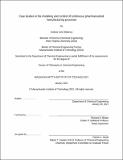| dc.description.abstract | The pharmaceutical industry employs a myriad of modalities; ranging from small molecules to
biologics such as peptides, monoclonal antibodies, bi-specific antibodies, and viral vectors. The
manufacturing of these products is as varied as the products themselves. Small molecules are
synthesized chemically; i.e. by a series of key chemical transformation, work-up, and recovery
steps. Larger molecules can be isolated from naturally occurring sources (i.e. humans, plants, or
other microorganisms), or produced via recombinant hosts such as Chinese hamster ovary (CHO),
Escherichia coli, or Saccharomyces cerevisiae, with some products requiring both a recombinant
host and transient transfection or infection with additional genetic material.
Across these modalities, industry, regulatory agencies and academia are investigating technologies for improved quality, efficiency, capability, and consistency. Of these technologies, continuous manufacturing (CM) is of particular interest due to its ability to allow for reduced equipment sizing and footprint, improved environmental sustainability, and improved process control. This thesis supports the implementation of continuous pharmaceutical manufacturing through advanced modeling, simulation, and control as described in three independent case studies.
The first work considers the development of a virtual plant for manufacturing of a small molecule
active pharmaceutical intermediate (API) through four chemical transformation, workup, and
recovery steps. The plant is used for uncertainty quantification, improved process design, and
novel process control strategy development. The second work considers the production of small,
globular proteins by the yeast Pichia pastoris. A model for copy number stability is developed and
validated using data in open literature and data generated at MIT. The third work concerns the
production of monoclonal antibodies (mAbs) using Chinese hamster ovary cells as a production
host. Hardware considerations, lower level regulatory controls, and advanced process modeling
and control for a heavily-instrumented mAb manufacturing testbed are discussed. Across this
thesis, the benefits of systems-level analysis in the continuous manufacturing of pharmaceuticals
is documented and demonstrated. | |
